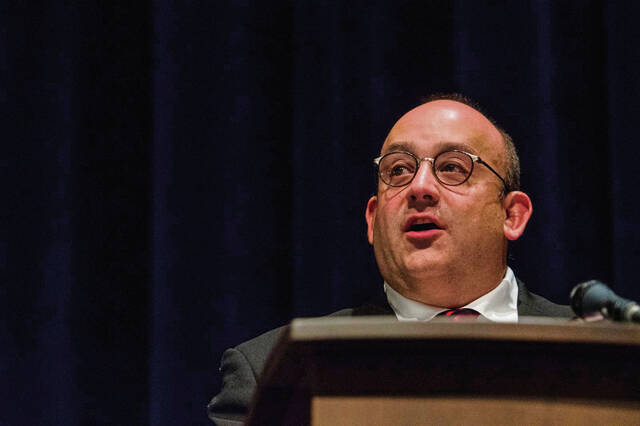https://staging.triblive.com/local/westmoreland/sequel-set-for-gop-westmoreland-commissioner-primary/
Sequel set for GOP Westmoreland Commissioner primary

Westmoreland County’s Republican primary for commissioner is a sequel.
Five of the same seven candidates who sought GOP nominations four years ago are again on the ballot this spring, with incumbents Doug Chew and Sean Kertes facing challenges from Patricia Fritz, Paul Kosko and John Ventre.
The Republicans are vying for the right to face off in November against two Democrats, running unopposed this spring, for control of the county board of commissioners.
Commissioners earn an annual salary of $92,210 per year, or $95,616 if they are chosen as commission chairperson.
For Chew and Kertes, it’s their first bid for reelection, which they say is warranted based on their stewardship of county government since 2020, a period that was overshadowed by the onset of the coronavirus pandemic just two months into their new jobs.
The covid-19 outbreak led a dramatic scaledown of operations, staff furloughs and a subsequent infusion of state and federal money to rebuild and recover from the shutdowns and economic impacts caused by the pandemic.
After an adversarial start to their terms, Chew and Kertes have formed an alliance of sorts heading into the 2023 campaign season.
“Doug and I since January have worked well together. The (Westmoreland County Republican Committee) endorsement has brought us closer together,” Kertes said. “Doug and I have done a great job dealing with inflation on the budget, we’ve kept expenses flat and we’re doing what we can to manage the courthouse appropriately.”
Both incumbents stressed their campaigns are separate but conceded there is a unified message.
“We are kind of a team, but we didn’t want to put out new signs,” Chew said. “I enjoyed working with my Republican partner and what I especially like is that his interests and mine are complementary. He’s interested in workforce development and I’m interested in mental health. That’s what makes us a very good team.”
Chew, 53, is a biochemist who previously worked as a researcher at the University of Pittsburgh.
Kertes, 36, is a former chief of staff to county commissioner Charles Anderson and served as a deputy to county Treasurer Jared Squires.
Kertes touted creation of county programs to promote future job growth and the elimination of blight throughout the county as the centerpieces of his first term.
“We’re priming Westmoreland County for future generations and we need to be competitive with all of western Pennsylvania. We need to retain people and we can’t do that by being stagnant,” Kertes said.
Chew pointed to the county’s reorganized human services department and increases in social service programs that have targeted mental health treatment. He also said the incumbents’ oversight of county spending, which has increased without a need for a tax increase through various revenue generating programs and additions to the local tax base, warrants a second term.
“We have been very interested to work on things to generate revenue. We’ve sold and rented (industrial) property. In the next term, the revenue we had there has been stagnant for a while, and we are working for that to go up in the future,” Chew said.
Challengers
Their challengers say not enough positive movement has occurred in county government in the last three years.
Kosko, 62, of Hempfield, retired last year after a 35-year career as a computer operations manager at the Municipal Authority of Westmoreland County.
Ventre, 66, of Hempfield is a retired security divisions manager at UPS. Ventre and Kosko finished third and fourth behind Kertes and Chew in the 2019 GOP primary. Like the incumbents, they are running coordinated but separate campaigns.
Kosko has campaigned on limiting the political influence county municipal authority board members and administrators have in government. He claims authority leadership has funneled money into Kertes’ campaigns for political influence in order to retain lengthy and expensive contracts to run the quasi-governmental agency that sells water to 122,000 customers in five counties and provides sewer service to nearly 30,000 regional customers.
“They’ve infiltrated the county commission. We need to start first by looking at the (authority) board members who are appointed by the county commissioners,” Kosko said.
Ventre, too, has made the water authority an issue in the race, targeting the agency over its refusal years ago to back state legislation that would have required Pennsylvania officials to conduct annual audits of its operations.
Ventre also is critical of the incumbents’ financial policies, and claimed the current board’s spending will require a tax increase in the years to come.
“The key issue is that we have a $5.6 million deficit we used covid-relief funds to mask. We have to do better to watch what we spend on. When 2027 comes, there will be no more covid money and we will have to have a tax increase,” Ventre said.
During the campaign, he pitched programs to target Republicans around the country to relocate to Westmoreland County and hold annual celebrations at the courthouse to honor the Second Amendment and gun rights.
Kosko said he will focus on bringing in additional state and federal dollars to bolster the budget and wants to enhance transportation opportunities in the county.
Fritz, 68, of Mt. Pleasant Township, finished sixth in the 2019 commissioners’ primary. She served as the second-in-command at the Westmoreland County Sheriff’s office before she was fired in 2018.
Her top issue is implementation of a property tax rebate for senior citizens.
“I love Westmoreland County and I’m here to do a job. People are leaving here because of the job market and I want to bring on a task group because we need to find out why,” Fritz said.
The race has been contentious at times.
“Sean has gotten bought and he’s made deals with everyone,” Kosko said.
Kertes denied the allegation and said documented political donations from supporters is not improper and that his decision making is not influenced by campaign cash.
“My actions speak louder than my words. I’ve seen his talking points and have yet to see one thing that he’s said he will do to help the county,” Kertes said.
Ventre endorsed Chew and donated to his campaign prior to the 2019 general election. Their relationship has since soured as Ventre blasted Chew for failing to follow through on a campaign promise he made four years ago, pledging to donate 60% of his $90,000 commissioners salary to help pay for drug court operations.
County records revealed Chew made no such donations during his first three years in office.
“Everything he said (four years ago) came off my website. He highjacked my talking points and now he’s completely reneged on his promise to donate 60% of his salary. I wasn’t sure about running but then I decided to run because it never sat well with me that he says he will donate 60% and gives nothing,” Ventre said.
Chew defended his decision to not make the donation, saying drug court didn’t need the cash infusion, and, in lieu of that pledge, has given money to local charities and others in need.
“Thirty days after I was elected I saw they didn’t need the money. Then in 2021 they (drug court) even returned (grant) money to the state,” Chew said.
Copyright ©2026— Trib Total Media, LLC (TribLIVE.com)
